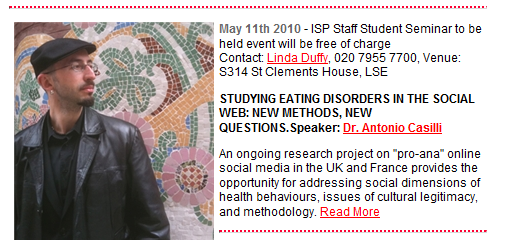So my seminar on pro-ana websites at the Institute of Social Psychology of the London School of Economics will not be canceled, despite the ash cloud. European airspace reopened, and everything’s cool. But let me tell you: I would never have skipped a seminar because of that. Because being a devoted academic means laughing in the face of volcanoes! Ah!!! Think Pliny the Elder! No… not a good example (he actually died in the eruption). Forget about Pliny then! Here’s a short presentation of what I’m going to talk about. See you there at 4 PM.
Studying Eating Disorders in the Social Web: New methods, new questions
An ongoing research project on “pro-ana” online social media in the UK and France provides the opportunity for addressing social dimensions of health behaviours, issues of cultural legitimacy, and methodology.
In recent years, the rise of an Internet movement advocating anorexia nervosa and bulimia nervosa has taken the public opinion by storm. The pro-ED movement presently takes the form of a constellation of blogs, underground networking services and discussion forums. If in the past, scientific knowledge and clinical treatment of eating disorders have benefited from a better understanding of their social determinants and implications, today it is computer-mediated interaction that has to be investigated to appreciate the potential progression of such disorders. As far as the Internet affects our modes of communication, friendship, and sociability, a comprehensive understanding of the pro-ana phenomenon would be a useful tool for public health policy intervention and information campaign design.
Assessing numerically the actual size of this “invisible web” reveals problematical. Pro-ana users are constantly putting in place new strategies to elude general public visibility. The use o cryptic language, specific codes of online conduct, and patterns of consumption principally aims to overcome censorship. It also enforces a set of values, hierarchies and social structures that develop into an ED- and technology-centered subculture. This calls for a reconsideration of established theoretical categories such as “self-help” and “lifestyle choice”, this also helps us rethink cultural legitimacy in networked society.
When dealing with relatively small, partly hidden, and vulnerable communities, limited use of quantitative methods is allowed. Although this difficulty can be overcome with qualitative empirical strategies (in-depth interviews, participant observations and case studies), the latter might miss the link between detailed micro-behavioural information and social structures at a macro level. In this presentation, I take a stance for mixed-method models by discussing the benefits of combining qualitative research with agent-based computer simulation in order to analyse the social networks of eating disorder sufferers, both online and offline.
